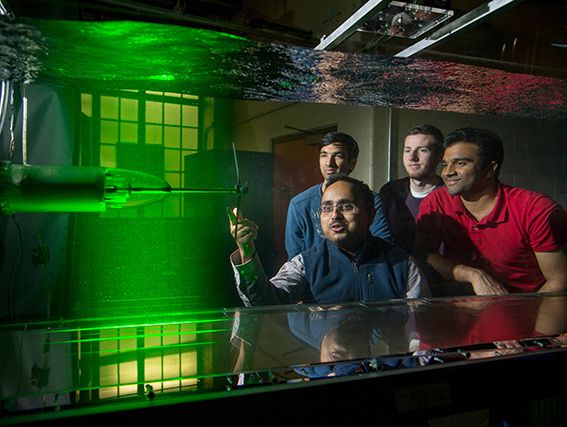Arindam Banerjee, an associate professor of mechanical engineering, is pursuing a three-year grant from the National Science Foundation to study the impact of free-stream turbulence on tidal turbines.
Tidal energy is a form of hydropower that converts the energy obtained from tides into electricity. As a form of sustainable energy, tides are more predictable than the wind and sun, and thus intriguing to engineers pursuing greener forms of generating electricity.
Tidal energy is produced with a tidal energy generator, which functions like an underwater wind turbine. The turbine captures the ebb and flow of the water, turning the turbine’s blades to power a generator and produce electricity.
Banerjee and his group will investigate the performance and durability of tidal turbines by mimicking the turbulent marine environment in a laboratory setting through the use of an active turbulence generator. The proposed work will address several outstanding scientific challenges that need to be overcome in order to increase the performance of the turbines and accelerate the technological readiness level of these devices.
With more than 50% of the population living within 50 miles of coastline, there is vast potential to provide clean, renewable electricity to communities and cities across the United States using marine and hydrokinetic (MHK) technologies. Through the commercialization of this energy technology, tidal energy resources have the potential of generating 300 terawatt-hours per year in the United States, powering roughly 27 million homes.
Banerjee's interest and expertise lie in multi-scale fluid-dynamics with emphasis on energy and biological systems. His research goal is to enhance our limited understanding of fundamental issues related to space and scale interactions in turbulent flows.
Banerjee earned a bachelor’s degree in mechanical engineering from Jadavpur University in Calcutta, India, a masters in mechanical engineering from the Florida Institute of Technology, and a doctorate in mechanical engineering from Texas A&M University. His postdoctoral study was at Los Alamos National Laboratory in New Mexico. Banerjee is the recipient of the prestigious NSF Early Career Award (2014), the Joel and Ruth Spira Teaching Excellence Award (2015) and the Libsch Early Career Research Award (2017).

